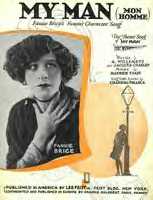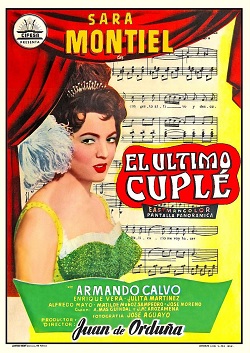
The "Argentine National Anthem" is the national anthem of Argentina. Its lyrics were written by the Buenos Aires-born politician Vicente López y Planes and the music was composed by the Spanish musician Blas Parera. The work was adopted as the sole official song on 11 May 1813, three years after the May Revolution; 11 May is therefore now Anthem Day in Argentina.

María Antonia Abad FernándezMML, known professionally as Sara Montiel, also Sarita Montiel, was a Spanish actress and singer. She began her career in the 1940s and became the most internationally popular and highest paid star of Spanish cinema in the 1960s. She appeared in nearly fifty films and recorded around 500 songs in five different languages.

La Cucaracha is a popular Mexican folk song about a cockroach who cannot walk. The song's origins are unclear, but it dates back at least to the 1910s during the Mexican Revolution. The song belongs to the Mexican corrido genre. The song's melody is widely known and there are many alternative stanzas.

"It's a Long Way to Tipperary" is an English music hall song first performed in 1912 by Jack Judge, and written by Judge and Harry Williams, though authorship of the song has long been disputed.

"Danny Boy" is a traditional song, with lyrics written by English lawyer Frederic Weatherly in 1910, and set to the traditional Irish melody of "Londonderry Air" in 1913.

"Marching Through Georgia" is a marching song written by Henry Clay Work at the end of the American Civil War in 1865. The title and lyrics of the song refer to U.S. Army major general William T. Sherman's "March to the Sea" to capture the Confederate city of Savannah, Georgia in late 1864.
"The Girl I Left Behind", also known as "The Girl I Left Behind Me", is an English folk song dating back to the Elizabethan era. It is said to have been played when soldiers left for war or a naval vessel set sail. According to other sources the song originated in 1758 when English Admirals Hawke and Rodney were observing the French fleet. The first printed text of the song appeared in Dublin in 1791. A popular tune with several variations, "The Girl I Left Behind Me", may have been imported into America around 1650 as "Brighton Camp", of which a copy dating from around 1796 resides in the Bodleian Library, Oxford.

"K-K-K-Katy" is a World War I-era song written by Canadian American composer Geoffrey O'Hara in 1917 and published in 1918. The sheet music advertised it as "The Sensational Stammering Song Success Sung by the Soldiers and Sailors", as well as "The Sensational New Stammering Song" The song was first played at a garden party fund-raiser for the Red Cross in Collins Bay on Lake Ontario. O'Hara was from Chatham, Ontario, and taught music at several universities.
"Amapola" is a 1920 song by Spanish American composer José María Lacalle García, who also wrote the original lyrics in Spanish. Alternative Spanish lyrics were written by Argentine lyricist Luis Roldán in 1924. French lyrics were written by Louis Sauvat and Robert Champfleury. After the death of Lacalle in 1937, English language lyrics were written by Albert Gamse. In the 1930s, the song became a standard of the rhumba repertoire, later crossing over into pop music charts.

"Mr. Lonely" is a song co-written and recorded by American singer Bobby Vinton, backed by Robert Mersey and his Orchestra. The song was first released on Vinton's 1962 album, Roses Are Red.

"Mon Homme" ,also known by its English translation, "My Man", is a popular song first published in 1920. The song was originally composed by Maurice Yvain with French lyrics by Jacques-Charles and Albert Willemetz. The English lyrics were written by Channing Pollock.
A war song is a musical composition that relates to war, or a society's attitudes towards war. They may be pro-war, anti-war, or simply a description of everyday life during war times.

Jean-Baptiste-Théodore-Marie Botrel was a French singer-songwriter, poet and playwright. He is best known for his popular songs about his native Brittany, of which the most famous is La Paimpolaise. During World War I he became France's official "Bard of the Armies".
The copla, copla andaluza, canción andaluza, canción española, tonadilla or canción folklórica is a form of Spanish popular song, deriving from the poetic form of the same name. Although the genre has a long heritage, it flourished in the 1930s and 1940s, and is epitomized by songwriters Antonio Quintero, Rafael de León and Manuel Quiroga.
"La Violetera" is a 1914 cuplé song, with the rhythm of a habanera, composed by José Padilla and with lyrics by Eduardo Montesinos, originally performed by Carmen Flores and popularized by Raquel Meller first and by Sara Montiel later. The instrumental version is also popular as a tango. In Spanish, a Violetera is a woman who sells violets.

The Violet Seller, better known under its Spanish title La Violetera, is a 1958 Spanish–Italian historical jukebox musical film produced by Benito Perojo, directed by Luis César Amadori and starring Sara Montiel, Raf Vallone, Frank Villard, Tomás Blanco and Ana Mariscal.

"Goodbye Alexander, Goodbye Honey Boy" is a World War I song describing an African American soldier going off to war and his girlfriend's reaction in his military service. The song is credited to Henry Creamer and Turner Layton, the writers of Sweet Emalina, My Gal and After You've Gone.

"When the Lilies Bloom in France Again" is a World War I era song released in 1918. Robert Levenson wrote the lyrics. George L. Cobb composed the music. It was published by Walter Jacobs of New York City and Boston, Massachusetts. There are two versions of the sheet music cover. One was designed by Rose Starmer. The cover is described as an "artistic words only cover." Another cover is a painting of a garden, with lilies in the foreground. The song was written for both voice and piano.

The Last Torch Song, better known under its Spanish title El último cuplé, is a 1957 Spanish jukebox musical film directed by Juan de Orduña and starring Sara Montiel, Armando Calvo and Enrique Vera.












